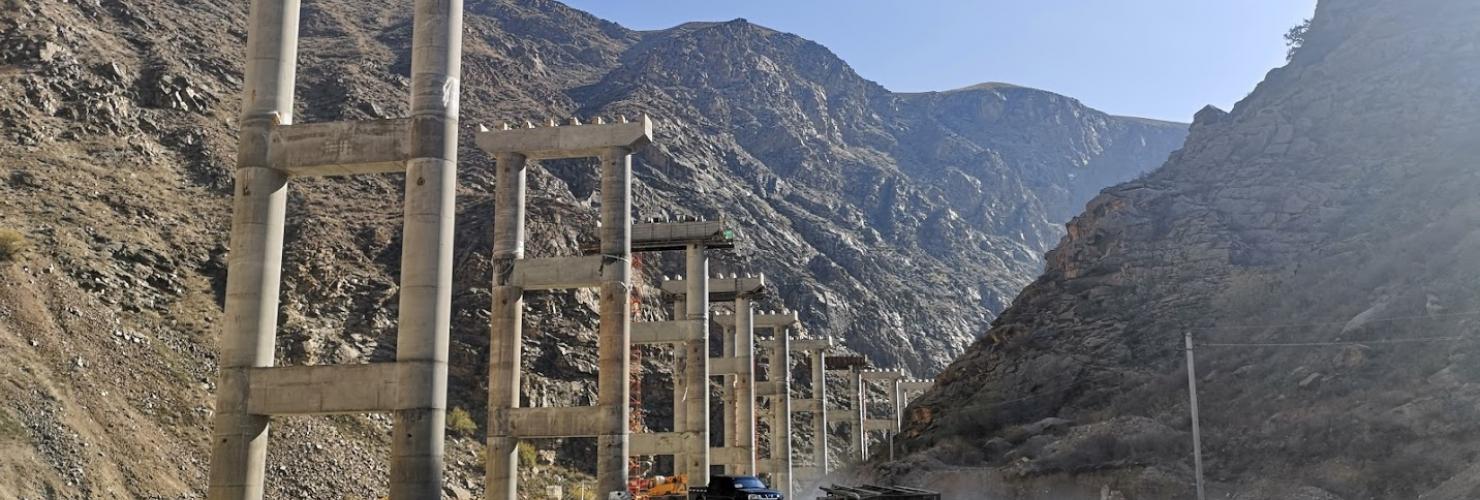

China building roads and bridges in Kyrgyzstan: A project fueled by ambition
Over the past decade, China has established itself as Kyrgyzstan’s most important economic partner. The China Road and Bridge Corporation (CRBC) is one of the most successful state-owned Chinese companies invested in projects in this landlocked and mountainous central Asian country. In his conversations with workers on the ground, Jacob Mardell found out that BRI is not only a tale of national, but also of personal ambition. He is currently travelling countries along the Belt and Road to investigate how the initiative is being implemented on the ground.
I'm at a work camp in Southern Kyrgyzstan, where CRBC are literally moving mountains in order to forge a brand-new road connection between the North and South of the country. CRBC’s simple, container box compound is flanked by swollen velvet hills, where goat herds and horses graze, and life trundles along at a premodern pace.
Chinese state-owned enterprises aren’t known for their transparency and openness. That’s why it’s such a pleasant surprise to find myself sipping an earthy Pu’erh tea with Mr. Song, a senior manager at China Road and Bridge Corporation (CRBC).
Song is part of the new generation of Chinese engineers - he is a young 33, quietly confident, easy to talk to. He is not exactly critical, but his speech is free from the yawn-inducing nothingness of officialese. At first, he cautiously prefaces statements by saying, “of course, this is my personal opinion,” but he soon warms to the idea that I’ve come precisely to hear his personal opinions.
Concrete fueled development vs. the rural idyll
The simple narratives are sometimes the best: humankind conquering nature, concrete fueled development vs. the rural idyll. Here, amid the mountains, sheep, and heavy machinery, it’s easy to see these dynamics in action. "There are parts of this route that you couldn't even cross on horseback,” Song tells me - "we are changing all of that."
The solemn impenetrability of these mountains has defined life here for millennia. The road will neuter them, and this is the essence of development. Song believes wholly in this civilizing development mission: “When we arrived here, some local people didn't want the road, they didn't understand - in their minds, they didn’t understand how this road would change them.”
Song has lived in Kyrgyzstan for ten years now. Before this project, he encountered similar resistance in the South. “The people had their sheep, they were satisfied about their lives and didn’t want to change. When I started the road, there was nothing, but once we’d finished, I saw they’d set up a business by the roadside and their mentality had changed. That’s the most important thing that needs to happen here - a change of mentality.”
"So you're sharing China's development experience?" I ask him. “Of course - 30, 40 years ago we were all against the capitalists, but now nobody cares about the system, we just want a better life.”
Over the past decade, China has established itself as Kyrgyzstan’s most important economic partner. Exim Bank of China, the entity that is bankrolling this road project, holds almost half of this small Central Asian republic’s external debt. China is also heavily investing in the Kyrgyz economy, largely in the mining sector.
China Road and Bridge Corporation undercut European competition
As Chinese officials often say, the Belt and Road is a “win-win,” both for China and the host countries of its manifold investment and infrastructure projects. One of the big wins for Beijing has been the development of companies like CRBC. In 2018, CRBC undercut European competition to win an EU-funded project in Croatia, causing controversy and prompting anxious questions about the competitiveness of European construction firms in a world dominated by Chinese giants.
“Between countries, it is like between people,” Song says, “If a person is working hard, studying hard, then they will secure a good future. China is working hard too. We want life to be better and these things push us to work.”
The Kyrgyz employees I speak to are near universal in their praise of the Chinese work ethic. Nurlan works for CRBC as an engineer. He’s gentle and disarmingly affable, but plain spoken - “Migration is in their blood,” Nurlan says of the Chinese workers, “they have a hard life, and they expect a hard life.”
Before CRBC, Nurlan worked for an Iranian company. “The Iranians like a comfortable life. They’ll order dinner at restaurants and expense it to the company. The Chinese,” Nurlan tells me, “are not spending money for themselves - only on the road.”
According to Nurlan, another big difference is that CRBC have capital to play with. “They can build with their own money,” Nurlan says, “the Iranians might have to lay down tools if their funds get caught up in the system, but I’ve never seen CRBC stop work.” CRBC will bid for tenders even if the profit margins are small or non-existent - “they have workers, equipment here, they need to keep working, so they will win even just to keep their position.”
Corporate appetite and personal drive
China’s infrastructure initiative isn’t just a tale of national ambition - of geo-economic will to expand influence and develop trade routes. The BRI is also a story of corporate appetite and personal drive. “The ambition of CRBC is to be the best contractor in the world,” Song tells me.
“And what about you?” I ask, “what do you work so hard for?”
“If I have the ability, I want to control a company branch. That's my purpose...I studied hard at school. I went to university. I want to do well." Song’s biggest challenge professionally: “the language barrier.” Personally? “I miss my family.” Homesickness is a problem for everyone here.
Next door to Song’s office I talk to two young engineers. Like Song, both men came here fresh out of university. One of them sports a Star Wars t-shirt and a thin gold chain. His name is Wu. He came to Kyrgyzstan in 2015, right after marrying his wife. “What does your wife think?” I ask.
“She definitely hopes to be together. We have a daughter, two years old. I had to sacrifice time with my family to be here.”
“And what did you get for this sacrifice?” I ask.
“What do I get in return…” He pauses and looks at his computer screen, as if hoping for an answer. “That’s a very good question. I also ask myself this often,” he says.
